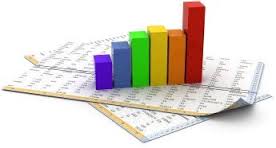
Nature of work
Often with the aid of mathematical techniques and software, a statistician interprets data and communicates results to his/her clients. He/she ensures that complex statistical concepts are explained in a way the client can understand and often advise on strategy.Below is a list of tasks that could be undertaken by statisticians:
- Consulting with clients and agreeing what data to collect and how it should be gathered taking into account any ethical and legislative considerations.
- Advising policymakers on key issues such as hospital waiting lists.
- Providing projections of future student numbers allowing for changes in the birth rate and assessing the number of teachers that will be needed in the sector.
- Designing experiments to assess the effects of drugs and associated side effects.
- Designing, implementing and analyzing clinical studies.
- Monitoring, reporting and modelling disease outbreaks.
- Collecting data to monitor levels of air pollution.
- Collecting data to measure the toxicity of food additives.
- Recommending whether certain items should be included in food production, e.g. folic acid in bread making.
- Checking quality control standards in industry.
- Designing experiments to improve the quality of new products.
- Predicting demand for products and services.
- Analyzing data to forecast trends for pension providers.
- Teaching statistical methods and the theory of statistics.
Environment of work
Flexible working hours are common allowing a statistician to choose the number of hours he/she works. Paid overtime is occasionally available. A statistician tasks tend to be mainly office based although he/she often travels to attend meetings with stakeholders and occasionally attends regional, national and international conferences.A medical statistician spends more than half of the time working alone. A statistician (particularly in the pharmaceutical industry) usually operates as a part of a multidisciplinary project team.
A Statistician may be self-employed often in a consultancy role. Part-time work, home-working and career breaks are often possible.
Professional life
Promotion within the Government Statistical Office GSO depends on performance and merit. An assistant statistician would be part of an accelerated promotion program and encouraged to move post every two years to ensure being exposed to as many different areas of statistics as possible. In order to obtain promotion, assistants are required to sit formal promotion boards, which are held fairly frequently for all grades.The higher grades at assistant statistician level can offer line-management responsibilities. Progression to a statistician grade will most likely involve heading up a statistics branch and managing a small team of assistants and administrators.
Outside the GSO, most organizations employ statisticians in smaller numbers, which means that opportunities for internal promotion may be limited. Promotion may be easier to find by changing employers. It is usually possible to switch between the different sectors after gaining a few years' experience.
There are many career options and opportunities for diversification or specialization at a later stage. With a PhD, prospects exist in research and possibly teaching at a medical school. Larger companies usually have a promotion structure that allows for advancement into more senior management positions.
Typical starting salaries is from 280000 SYP
Getting the job
Graduates who have a degree with a quantitative component may have an advantage but those of any discipline are accepted. People from other professions can also apply to work in medical statistics usually after they have taken a Masters degree in the subject.Examples of quantitative degrees include:
- Mathematics.
- Economics.
- Operational research.
- Life or medical science.
- Business-related subjects.
- Social and political sciences.
- Psychology.
- Geography.
Skills
A candidates needs to show evidence of the following:- Computer literacy.
- Analytical ability and communication skills.
- Clear understanding of statistical terms and concepts.
- Ability to work alone as well as in teams.
- Ability to work with data and people at all levels within a range of organizations.
The choice of final year dissertation can be significant. These projects can provide a way of making useful contacts within the profession and acquiring knowledge, which would be of great value in the labor market.
Sources and references
www.arabicstat.com, Arab Statistical Association. www.aitrs.org, Arab Instiute for Training and Researches of Statical
www.uarabs.org, Union of Arab Statistical.
Arab Standard Classification of Occupations, 2008, Ed. Arab Labor Organization
Summary
A statistician is concerned with the collection, analysis, interpretation and presentation of quantitative information. He/she works in a range of sectors including health, education, government, finance, environment, transportation and market research.A statistician designs and manages experiments and surveys, and deals with the initial collection of data. He/she processes and analyses the data in context looking for patterns to help in making decisions. He/she advises on findings and recommend strategy.
